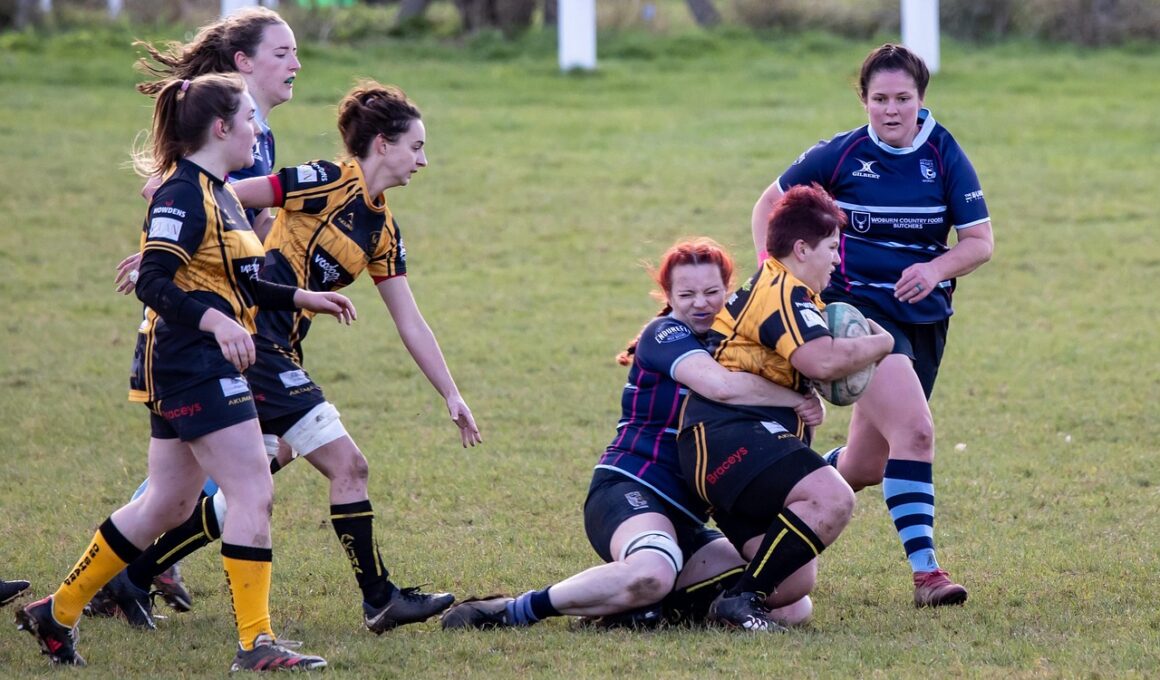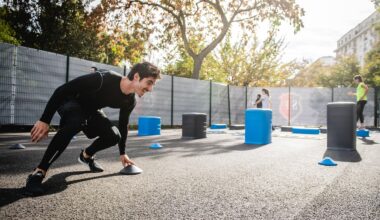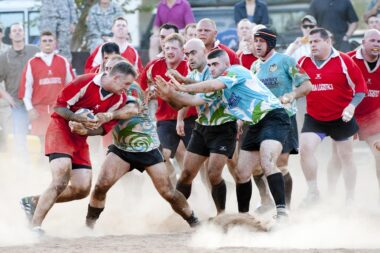Adapting Rugby Training for Different Age Groups
Rugby is a sport that teaches teamwork and resilience, and adapting training techniques for various age groups is crucial. Coaches should tailor their methods to the physical and psychological development of players. Younger players require a focus on fundamental skills, fun, and fostering a love for the game. Creative drills that engage their interest, such as tag rugby, are vital at this stage. As players enter their teenage years, training can introduce more complex tactics, strength conditioning, and competitive play. Coaches should emphasize safety, teaching the rules and techniques to prevent injuries. At the senior level, rugby becomes more intense, demanding strategic understanding and physical fitness. Programs at this level should include detailed analyses of match play, allowing athletes to hone their strategic thinking. Nutrition and recovery also play significant roles in senior training regimes. Players should be educated on proper diets and recovery techniques. Additionally, integrating technology in training, like video analysis, can greatly enhance players’ skills and performance. Ultimately, recognizing the diverse needs across age groups is essential for nurturing lifelong rugby enthusiasts, ensuring a positive path for all who engage in the sport.
Younger Players: Foundation Building
For younger players in rugby, training should emphasize a comprehensive approach that fosters basic movement skills and game familiarity. Coaches can design activities that build confidence while teaching essential rugby techniques. These may include drills focusing on passing, catching, and footwork. Moreover, small-sided games can promote teamwork and decision-making without overwhelming young athletes. Training sessions should be fun, incorporating games that develop skills naturally rather than through monotonous drills. It’s essential to encourage a playful yet competitive atmosphere to engage kids and maintain their interest in the sport. Furthermore, coaches should communicate positive reinforcement and constructive feedback, helping foster a growth mindset. As children vary significantly in physical and emotional maturity, adapting drills to accommodate different skill levels is necessary. Consider segmentation during practices, allowing players to practice at their comfortable pace while challenging them adequately. While skill development is paramount, fostering good sportsmanship cannot be overlooked. Coaches should stress the importance of respect for teammates, opponents, and officials, embedding these values as formative lessons in young athletes’ experiences.
As players transition into their teenage years, rugby training should evolve to match their growing physicality and cognitive abilities. Coaches must adapt training sessions consequently, focusing on developing strategic understanding and advanced skills, such as tackling and scrummaging. This stage is crucial for reinforcing discipline, teamwork, and competitive spirit. Effective communication within a team becomes increasingly important at this age. Coaches should implement drills that require players to make tactical decisions under pressure, promoting awareness of game dynamics. Fitness training should enter the picture, incorporating strength and conditioning tailored to younger bodies. Proper emphasis on technique and safety in tackling methods can reduce injury risk. Additionally, introducing game scenarios allows players to practice decision-making in real-time, which is invaluable for their development. Incorporating video analysis of games and training sessions can provide insights into performance, helping athletes identify areas for self-improvement. Mentorship opportunities, where older players guide younger teammates, can foster camaraderie and a sense of belonging. Ultimately, the aim is to cultivate not only skilled athletes but also individuals who embody the spirit of rugby, encouraging passion for the game while developing lifelong friendships.
Senior Level Training: Intensity and Strategy
At the senior level, rugby training necessitates a shift towards increased intensity, strategy, and professionalism. Athletes must be fully dedicated, demanding high levels of fitness, discipline, and commitment. Training sessions should integrate highly specialized skills, game tactics, and mental evaluation. Coaches need to drill the importance of physical conditioning, focusing on strength, endurance, speed, and agility. Additionally, strategies for injury prevention, including prehab exercises and recovery practices, should be introduced. Nutrition takes precedence, as athletes must fuel their bodies with adequate macronutrients to support rigorous training and match days. Educating players about hydration and pre-and post-game meals is essential for optimal performance. During tactical sessions, coaches should breakdown match footage, promoting analytical skills and strategic planning essential for success on the field. Implementing competitive scenarios during training further prepares players for high-stakes environments. Emphasizing mental toughness and resilience can enhance performances during crucial matches. Lastly, fostering a community environment where support and mentorship flourish amongst teammates can increase team cohesion, boosting morale and unity on and off the field.
While the framework remains vital, the essence of adapting training for age groups lies in understanding mental and emotional development. It is crucial for coaches to maintain open communication, ensuring athletes feel supported and valued. Regular feedback, coupled with opportunities for self-reflection, empowers players to take ownership of their development journey. Integrating technology into training, such as fitness tracking apps or coaching platforms, enhances the athlete’s experience. Adopting games that teach skills, tactics, and high-pressure scenarios prepares players effectively for matches, creating a well-rounded athlete. Encouraging a culture of respect, encouragement, and celebration of achievements is vital in shaping positive attitudes towards the sport. On match days, coaches must balance strategy and empathy, adapting approaches based on players’ mental states. At all ages, fostering a love for the game should remain at the forefront. Ensuring that athletes leave each session feeling accomplished, whether learning a new skill or understanding teamwork better, strengthens their long-term engagement with rugby. Overall, the goal is to inspire the next generation of players who are passionate, skilled, and respectful of the sport.
The Role of Parents in Youth Rugby
Parents play a significant role in their children’s rugby journeys, and their support can greatly influence participation and enjoyment. Coaches should actively involve parents, educating them on the importance of skill over competition. Ensuring that parents understand the benefits of a supportive environment encourages children to feel safe and excited about participating. Holding workshops or informational sessions can help establish a constructive dialogue between coaches and parents. Open communication ensures that both parties align on objectives for player development. Parents can assist by volunteering for training sessions, organizing transportation, or even providing nutritional snacks during practices. They play a crucial role in reinforcing the values taught on the field at home. Encouraging positive reinforcement from parents can help children process setbacks and challenges more effectively. Furthermore, parents should model good sportsmanship, teaching children to respect referees, opponents, and teammates alike. Recognizing and celebrating individual and team achievements nurtures a positive atmosphere within the rugby community. Fostering these relationships not only strengthens team dynamics but also helps to create a supportive and inclusive sporting environment for all. Ultimately, a strong parent-coach relationship greatly benefits the development of young players.
As young athletes grow and progress through rugby training, adapting methodologies at all levels is critical to their success. This includes acknowledging how different players engage with the game physically and emotionally. Each practice should cultivate a passion for the sport, promoting development through fun, competitive, and safe environments. Coaches face the task of infusing creativity into training sessions, making drills more enjoyable and diverse. Keeping practices engaging helps maintain athletes’ interest and dedication to rugby. As they graduate into older age brackets, the focus must shift to cultivating athletic professionalism, emphasizing commitment, fitness, and teamwork. It is vital to balance competitiveness with enjoyment, ensuring that athletes feel supported rather than pressured. A community of support will enable young athletes to thrive, celebrating their growth and eventual transitions into full-fledged rugby players. Coordination amongst parents, coaches, and clubs results in fostering environments where future stars can flourish. In doing so, rugby training can be a transformative tool, instilling everlasting life skills while simultaneously preparing competent, passionate athletes for the field. Ultimately, adapting rugby training ensures that it remains a captivating sport enjoyed across ages, cultures, and backgrounds.





